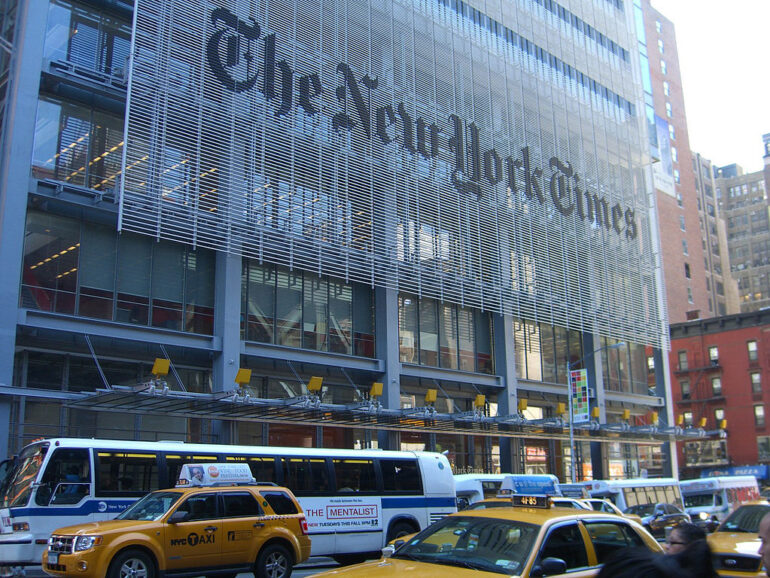The Manhattan apartment building where Joseph Kahn, the executive editor of The New York Times, resides was reportedly vandalized early Friday morning in an incident that underscored the increasingly hostile climate surrounding coverage of the war in Gaza.
In front of the Greenwich Village building, vandals scrawled the phrase, “Joe Kahn Lies Gaza Dies,” in black paint, according to photos taken at the scene. Other images showed red paint splashed across the property. The act appeared to be an explicit protest against the paper’s reporting on the conflict.
The New York Police Department said it responded shortly before 5 a.m. to reports of graffiti at the address. “Upon arrival, officers observed paint on the front steps and doors of the above location,” the NYPD said in a statement reported by NBC News and the New York Post.
Charlie Stadtlander, the paper’s executive director for media relations and communications, condemned the act as a line that should not be crossed. “People are free to disagree with The New York Times’s reporting but vandalism and targeting of individuals and their families crosses a line and we will work with authorities to address it,” he said in a statement.
Friday’s attack comes just a month after The Times’s main office in Manhattan was itself defaced with red paint. That incident also left behind a slogan nearly identical to the one used outside Mr. Kahn’s residence: “NYT lies Gaza dies,” NBC News reported. At the time, a spokesperson for the paper sought to emphasize its editorial independence. “As an independent news organization, we receive criticism regularly from those representing entrenched perspectives, hoping to change our reporting,” the spokesperson said.
While stressing support for freedom of expression, the statement added: “While we support the right of groups and individuals to express their point of view, we will not let advocacy groups sway us from covering the conflict fully and fairly.”
For conservatives, the events highlight a troubling double standard in the current political climate. Many on the left have championed protest as free expression, even when it crosses into intimidation.
Yet the same voices are quick to denounce speech they find objectionable. Targeting a private residence — not just an institution — raises sharper concerns about the safety of individuals and their families, and about whether activists believe they are entitled to silence reporting with which they disagree.
Critics argue that vandalism aimed at media figures demonstrates less a desire for accountability than an effort to coerce coverage through fear.
With tensions over Gaza running high, the repeated defacement of The Times suggests a pattern of escalation.
Law enforcement’s early morning response underscores the seriousness with which authorities are treating the matter, but the broader question is whether America’s most prominent newspaper — long regarded by many conservatives as slanted in its coverage — will finally recognize that its own leadership is not immune from the culture of intimidation that political violence breeds.
[READ MORE: Attorneys Seek Gag Order on Trump Officials as DHS Labels Salvadoran National an MS-13 Gang Member]





